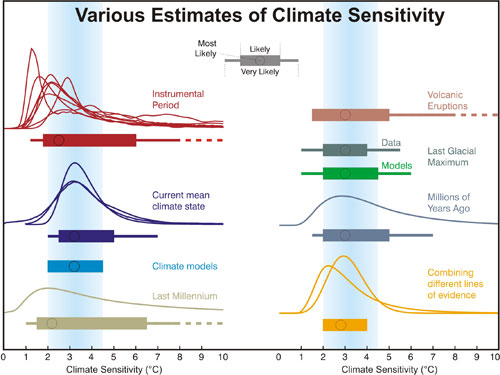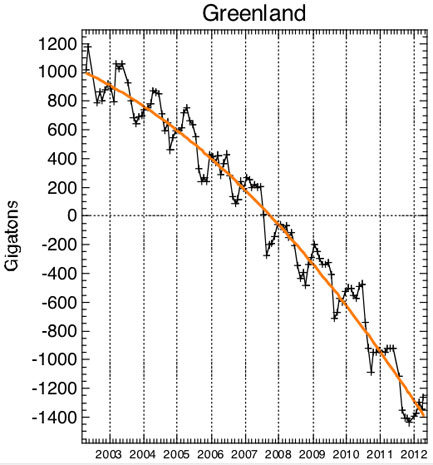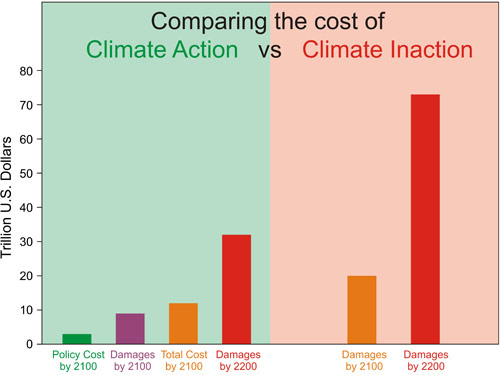
Note: this post has been quoted in the November 2012 issue of WIRED magazine.
Matt Ridley has an article published in the September 2012 issue of WIRED magazine, which appears to be their cover story this month. The article is full of misleading and inaccurate claims, logical fallacies, and quite frankly is little more than an attack on environmental concerns in general. Not surprisingly, it was republished and hailed by the usual climate denial enablers. The article essentially claims that every environmental concern over the past half century can be boiled down to 'alarmism'.
For example, Ridley pooh-poohs the adverse health effects of DDT, downplays the role of chlorofluorocarbons (CFCs) in ozone depletion, the health risks associated with air pollution, and so on. The general theme of the article is that because these other environmental concerns did not result in catastrophic consequences, environmental concerns in general can be considered overblown alarmism.
Now, there is of course a glaring logical fallacy in this argument - we took action to address all of these prior environmental concerns. We phased out the use of DDT and CFCs, passed Clean Air Acts to reduce air pollution, etc. In fact, we recommend that anyone reading Ridley's article first put on a head vise, because he manages to undercut the premise of his own argument by making this very point:
"By the 1970s the focus of chemical concern had shifted to air pollution....driven partly by regulation and partly by innovation, both of which dramatically cut the pollution coming from car exhaust and smokestacks, ambient air quality improved dramatically in many cities in the developed world over the following few decades."
You might wonder how Ridley can make the argument that these prior environmental concerns were overblown because they did not have catastrophic results, when he himself admits that we took steps to stem their adverse impacts. Please keep your head vise on while you try to figure out the answer to that question, and if you do figure it out, please let us know. Chris Goodall debunks many of the claims Ridley makes with regards to past environmental threats in a good post at Carbon Commentary.
By this point you have probably guessed where Ridley's article ultimately ends up - claiming that concerns about climate change are overblown because these previous environmental concerns were supposedly overblown. Ridley claims that the consequences of climate change probably won't be all that bad, and that based on the lessons of these previous environmental concerns (you know, the ones where we listened to the scientific experts and addressed the problem), we should start listening to the "lukewarmers", whose climate-related myths Ridley begins to reel off one by one.
Here is how Ridley begins his discussion about what he calls "lukewarmers":
"We hardly ever allow the moderate “lukewarmers” a voice: those who suspect that the net positive feedbacks from water vapor in the atmosphere are low, so that we face only 1 to 2 degrees Celsius of warming this century"
It's rather strange that Ridley claims that we hardly ever hear from this group, considering how frequently the few climate scientist "lukewarmers" (i.e. Richard Lindzen and John Christy) are published in the mainstream media or invited to testify before Congress. In reality the "lukewarmers" are disproportionately over-represented, particularly in the mainstream media.
Regardless, at this point we actually have a good amount of empirical data to measure the water vapor feedback. For example see our discussion here, a list of relevant scientific papers here, and a new paper by Dessler (2012) here. The literature consistently shows that the water vapor feedback is a positive strong one, as we expect. Dessler (2012) described observational data from 2000 through 2010:
"climate variations were also amplified by a strong positive water vapor feedback (~ +1.2 W/m2/K)"
We are left wondering why "lukewarmers" supposedly suspect that the water vapor feedback is a weak one when the empirical data clearly indicate otherwise. Ridley suggests that "lukewarmers" also think we only face 1-2°C warming this century, but under what emissions scenario does this belief apply? For example, if we reach an atmospheric CO2 level of 900 ppm by 2100 (which is entirely plausible if we follow Ridley's advice and don't worry about global warming or take action to mitigate it), a resulting 2°C warming over the next century (~2.8°C since pre-industrial times) would correspond to a climate sensitivity of only about 1.6°C for doubled CO2.
Do "lukewarmers" really believe that climate sensitivity cannot be higher than 1.6°C when the body of scientific literature puts the likely range between 2°C and 4.5°C for doubled CO2 (Figure 1)?

Figure 1: Distributions and ranges for climate sensitivity from different lines of evidence. The circle indicates the most likely value. The thin colored bars indicate very likely value (more than 90% probability). The thicker colored bars indicate likely values (more than 66% probability). Dashed lines indicate no robust constraint on an upper bound. The IPCC likely range (2 to 4.5°C) and most likely value (3°C) are indicated by the vertical grey bar and black line, respectively. Adapted from Knutti and Hegerl (2008).
According to Ridley, "lukewarmers" also believe
"that the Greenland ice sheet may melt but no faster than its current rate of less than 1 percent per century"
The problem with this particular statement is that the Greenland ice sheet is probably already melting faster than when Ridley wrote it (Figure 2).

Figure 2: Greenland ice mass anomaly - deviation from the average ice mass over the 2002 to 2010 period. Black line shows monthly values. Orange line shows long-term trend (John Wahr).
The Greenland ice sheet mass declined by approximately 250 billion tons per year from 2003 to 2009 according to Gravity Recovery and Climate Experiment (GRACE) data (Schrama and Wouters 2011), and the decline is accelerating by approximately 30 billion tons per year.
We know Ridley expects global warming to accelerate, because we saw 0.8°C surface warming over the past century, whereas he expects 1-2°C warming over the next century. So for "lukewarmers" to believe the current rate of Greenland ice sheet mass loss will remain steady over the next century, somehow the current accelerating mass loss will have to stop despite accelerating global warming. Try explaining that one.
The next thing Ridley claims "lukewarmers" believe is
"that net increases in rainfall (and carbon dioxide concentration) may improve agricultural productivity"
It's true that some places will see increased rainfall while others will see a decrease. Perhaps we should consult projections of future drought (via the Palmer Drought Severity Index [PDSI]) to determine how agricultural productivity might fare in a warmer world, from Dai (2010) (Figure 3).
Figure 3: the potential for future PDSI worldwide over the decades indicated, based on current projections of future greenhouse gas emissions (Source)
This is not a pretty picture (except for the nice colors, of course). By the 2030s most of the United States southern Europe, southeast Asia, northern and southern Africa, eastern Australia, etc. will regularly face droughts around the same severity as those which seriously adversely affected American agricultural productivity this summer. Northern Canada and Siberia may become suitable for agricultural productivity - do we want to move all of our crops to those regions?
Ridley also notes that "ecosystems have survived sudden temperature lurches before." This is true, but is mere survival the standard we want to set for ourselves and the ecosystems on which we rely? Moreover, there have been mass extinction events during which ecosystems did not survive sudden temperature lurches. In fact, there is evidence we may be entering the sixth such mass extinction event. Do we really want to take that risk under Ridley's reassurance that ecosystems might be able to survive it?
It is perhaps not surprising that Ridley advocates this high risk approach. As Andy S previously discussed, Ridley was the non-executive Chairman of Northern Rock, a British bank that, in 2007, was the first in over a century and a half to experience a run on its deposits. The bank had allowed itself to become extremely over-leveraged, with debts more than 50 times its shareholder common equity. Ultimately Northern Rock was bailed out, borrowing £3 billion from the Bank of England over the span of a few days in 2007.
Unfortunately if Ridley is wrong in his foolhardy approach toward climate risk, there is nobody to bail us out when the climate goes awry.
Finally, Ridley says that "lukewarmers" believe
"that adaptation to gradual change may be both cheaper and less ecologically damaging than a rapid and brutal decision to give up fossil fuels cold turkey."
This is of course a strawman argument - nobody suggests that we should immediately cease burning all fossil fuels. The transition away from fossil fuels will be a slow and difficult one, but we must do it as quickly as possible, because time is running out. Additionally, the benefits of the solutions which have actually been proposed (i.e. carbon pricing) exceed the costs several times over (Figure 4).

Figure 4: Approximate costs of climate action (green) and inaction (red) in 2100 and 2200. Sources: German Institute for Economic Research and Watkiss et al. 2005
In general, Ridley's argument suffers from the fallacy of false equivalence. For example, he equally criticizes concerns about ozone depletion and air pollution (real environmental hazards that caused measurable damage which we addressed by reducing emissions of the responsible substances) with predictions of December 2012 apocalypse (pure fiction) and concerns about climate change (a very real and very large threat which we have yet to address).
Ridley's dismissal of the climate change threat because past threats have not resulted in catastrophe is entirely illogical. Consider a doctor treating a patient for a potentially deadly infection. The doctor prescribes antibiotics, which successfully treat the infection, and the patient survives. A few years later, the doctor diagonses the same patient with cancer. If Ridley were the patient in this scenario, he would claim that the cancer is no threat because the infection did not kill him.
Ridley has not painted those he describes as "lukewarmers" in a flattering light in this article. Apparently they believe that climate change cannot possibly result in catastrophic consequences because no environmetal concern in modern times has resulted in catastrophe, ignoring the fact that we have taken steps to address all prior environmental threats. "Lukewarmers" also apparently do not believe that the water vapor feedback is strongly positive, even though that is what the scientific data indicates, or that climate sensitivity could be within the likely range of values from the scientific literature. They think that the Greenland ice sheet decline - which is already accelerating - will not accelerate. They think agricultural productivity will increase despite measurements and projections of increasing drought. And instead of considering serious proposals to mitigate global warming, they claim that we 'alarmists' want to immediately cease burning all fossil fuels.
As we noted when discussing a recent Wall Street Journal article from some other climate contrarians, the beauty of publishing articles in the mainstream media is that unlike in the scientific literature, you are not expected to support your assertions. As a result, Ridley is able to make a mockery of all previous environmental concerns by rewriting history. Ridley also manages to mostly ignore the fact that the reason these past environmental threats did not result in very bad consequences is that we took action to prevent that from happening (except when he undermines the entire premise of his article by making that very point).
The exact same thing is true of climate change - if we take action to mitigate the problem, we can avoid catastrophic consequences. We can also address the problem in a way that results in a net benefit not just for global ecosystems, but even for human economies (see this NY Times piece for a good discussion on the subject). Unfortunately Ridley does not offer any constructive discussion about how we should address the problem; instead he continues his caricature of alarmist environmentalists by claiming that the only proposed solution to the problem involves immediately ceasing all fossil fuel use. It is unfortunate that WIRED prominently featured such a counterfactual and unconstructive article.
Posted by dana1981 on Wednesday, 29 August, 2012
 |
The Skeptical Science website by Skeptical Science is licensed under a Creative Commons Attribution 3.0 Unported License. |